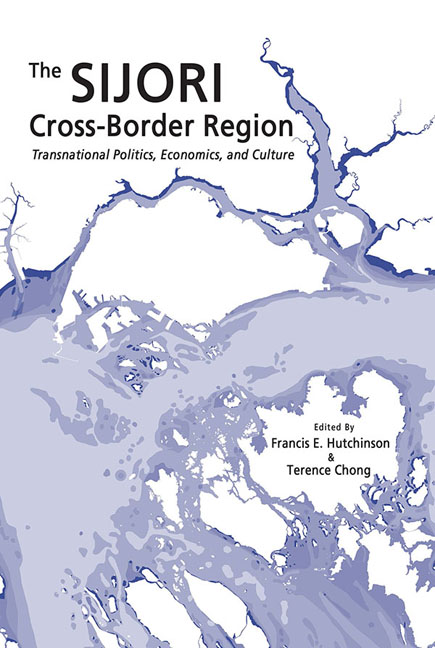Book contents
- Frontmatter
- Contents
- List of Maps
- List of Tables
- List of Figures
- Foreword
- Acknowledgements
- Contributors
- Abbreviations
- Introduction
- Section I Understanding the Whole
- Section II Policy and Politics
- Section III Cross-Border Social and Cultural Communities
- Section IV Formal and Informal Economies
- Map5
- 13 The Airport and the Territory: Transnational Flows in the Singapore- Johor-Riau Cross-Border Region
- 14 Revisiting Industrial Dynamics in the SIJORI Cross-Border Region: The Electronics Industry Twenty Years On
- 15 Development in Johor and Singapore's Water Access: Challenges and Opportunities
- 16 The Role of Ethnic Chinese Business Networks in the Regionalization Strategy of Singaporean Fish Farming Firms
- 17 Pirates and Law Enforcement Agencies: Complex Relations Across the Malacca Straits
- Conclusion
- Appendix
- Sources for the SIJORI Maps
- Index
17 - Pirates and Law Enforcement Agencies: Complex Relations Across the Malacca Straits
from Section IV - Formal and Informal Economies
Published online by Cambridge University Press: 22 July 2017
- Frontmatter
- Contents
- List of Maps
- List of Tables
- List of Figures
- Foreword
- Acknowledgements
- Contributors
- Abbreviations
- Introduction
- Section I Understanding the Whole
- Section II Policy and Politics
- Section III Cross-Border Social and Cultural Communities
- Section IV Formal and Informal Economies
- Map5
- 13 The Airport and the Territory: Transnational Flows in the Singapore- Johor-Riau Cross-Border Region
- 14 Revisiting Industrial Dynamics in the SIJORI Cross-Border Region: The Electronics Industry Twenty Years On
- 15 Development in Johor and Singapore's Water Access: Challenges and Opportunities
- 16 The Role of Ethnic Chinese Business Networks in the Regionalization Strategy of Singaporean Fish Farming Firms
- 17 Pirates and Law Enforcement Agencies: Complex Relations Across the Malacca Straits
- Conclusion
- Appendix
- Sources for the SIJORI Maps
- Index
Summary
INTRODUCTION
The relationship between the pirate and the border is an old one. On one hand, the pirate has often been depicted as an anarcho-nihilist in Western literature, from Captain Johnson, a.k.a. Daniel Defoë (Johnson 2010), to Gilles Lapouge (2004). According to the literature, pirates flee from the law and states while ignoring borders and rules. However, archaeologist Jean-Pierre Moreau demystified seventeenth–eighteenth century piracy when he described the pirate community as one governed by strict hierarchy, discipline on board and social welfare for injured pirates (Moreau 2006). In Southeast Asia, based on the testimony of the Chinese customs inspector Zhao Rugua or Chou Ju-kua (1170–1228), seamen who attacked nearby ships sailing from or to rival entrepôts were deemed to be “pirates”. But from the seasmen's viewpoint, they were only “collecting taxes” from the boats sailing off the coast of the Sriwijaya thalassocracy, centred on the city of Palembang in South Sumatra (Coedes 1989). They may have been considered privateers as they operated in the name of a ruler. Just like the pirates in the Caribbean Sea in the sixteenth–eighteenth centuries, they were in touch with a political authority, especially in the nineteenth century when the pirates were linked to the Riau-Lingga sultanate and fought against both the British as well as American powers (Lombard 1979).
Today, in a post-Cold War era, pirates are also a symbol of the dark side of globalization. Deemed to be non-state actors, Article 101 of the United Nations Convention on the Law of the Sea (UNCLOS) (United Nations 1982) defines piracy as disassociated from political entities. According to UNCLOS, piracy consists of “any illegal acts of violence or detention, or any act of depredation, committed for private ends by the crew or the passengers of a private ship or a private aircraft, and directed … on the high seas …”. However, in 2013, about 79 per cent of piracy incidents in Southeast Asia occurred against berthed or anchored ships in territorial waters (ICC-CCS 2013). For this reason, an International Maritime Organization (IMO) circular completes the UNCLOS definition by adding “armed robbery against ships” (taking place in territorial waters) to the “piracy” strict sensu.
- Type
- Chapter
- Information
- The SIJORI Cross-Border RegionTransnational Politics, Economics, and Culture, pp. 431 - 446Publisher: ISEAS–Yusof Ishak InstitutePrint publication year: 2016



